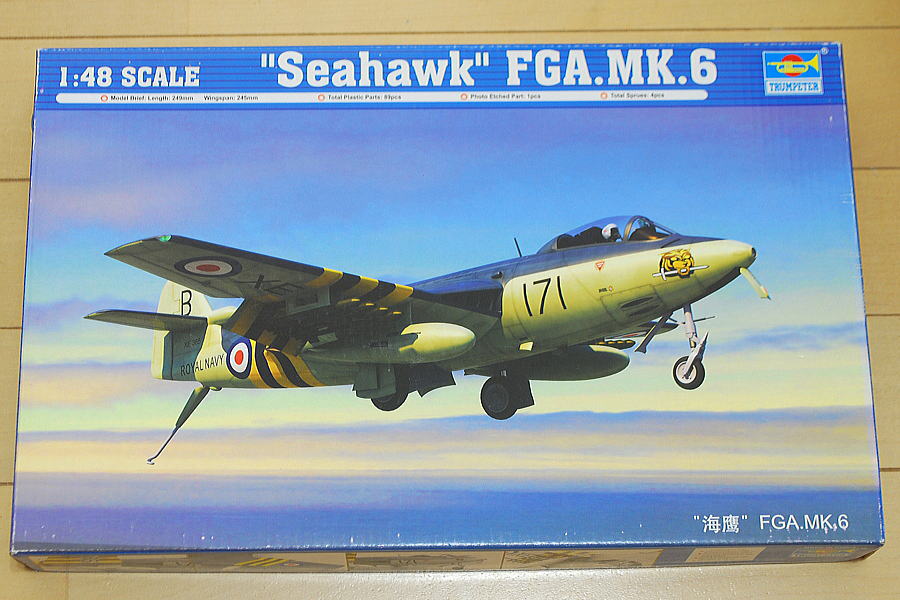 Once again, an airplane plastic model. It’s a first-generation jet fighter of the Royal Navy, the Hawker Seahawk.
Once again, an airplane plastic model. It’s a first-generation jet fighter of the Royal Navy, the Hawker Seahawk.
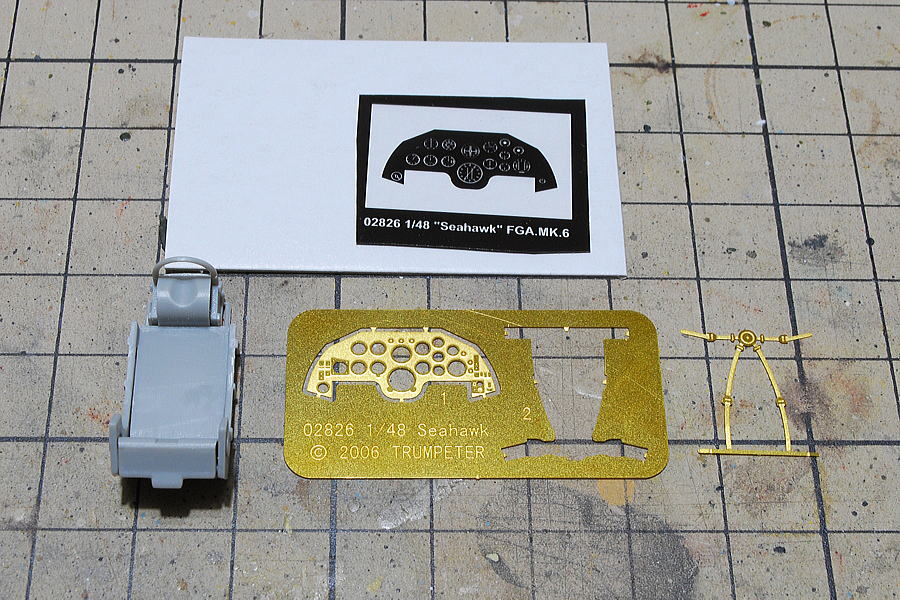 There is a carved seal of 2006 on the photo-etched parts. It has passed for ten years since its release. I thought it was still a new kit, but was it ten years ago?
There is a carved seal of 2006 on the photo-etched parts. It has passed for ten years since its release. I thought it was still a new kit, but was it ten years ago?
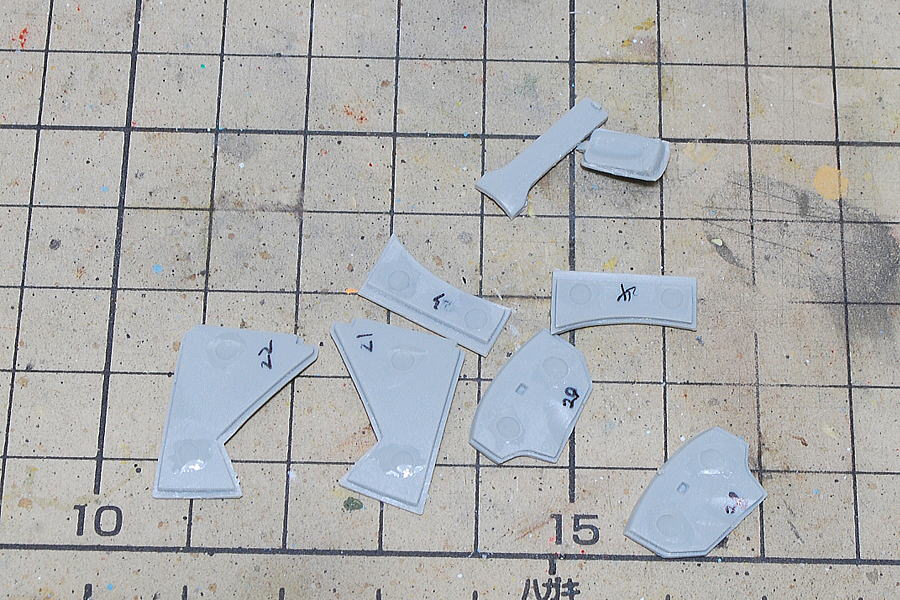 I used putty for these injection pin marks.
I used putty for these injection pin marks.
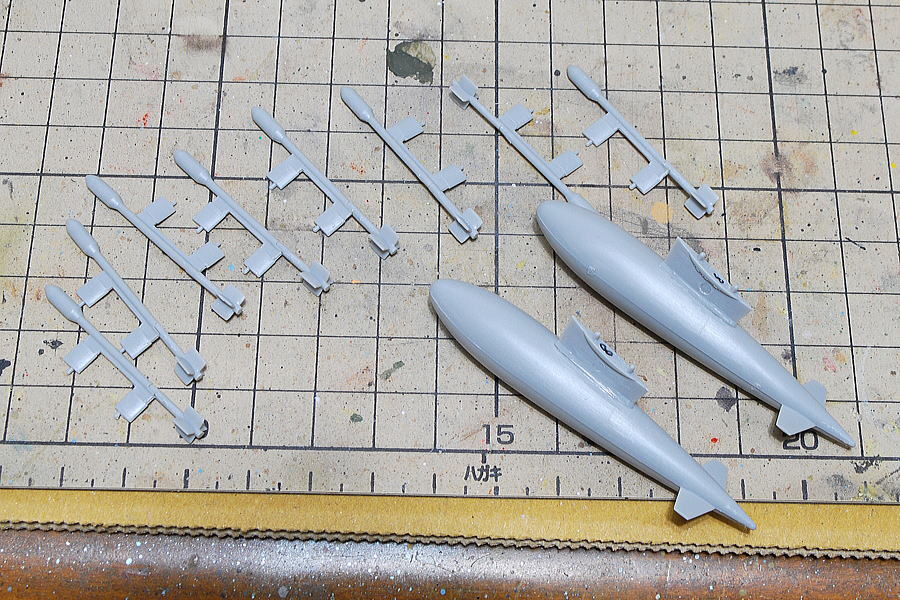 I’m making the rocket bombs and belly tanks first. These works are too much of a bother after the central body painting.
I’m making the rocket bombs and belly tanks first. These works are too much of a bother after the central body painting.
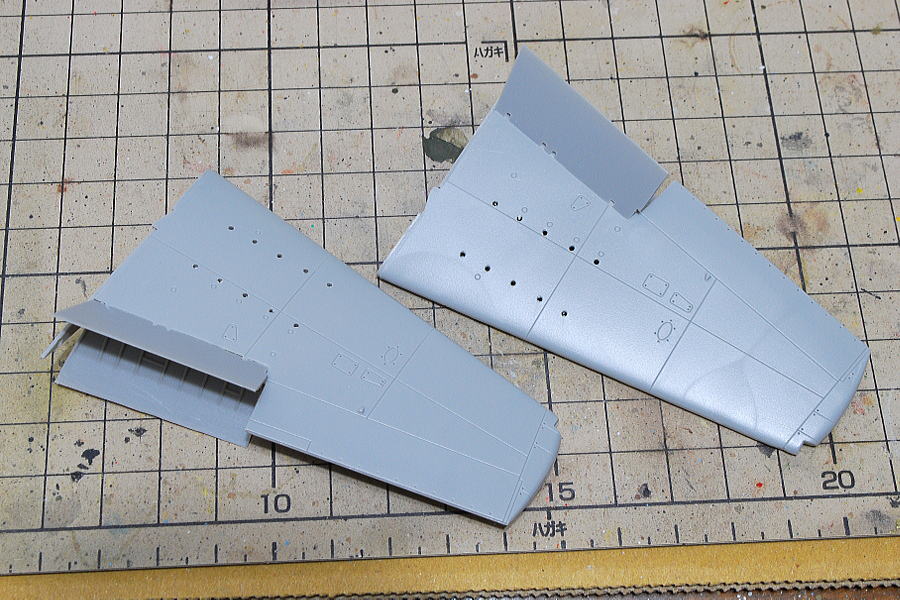 Mounting holes of the rockets, because there are five columns of molds, I had opened all. I checked the instruction; there are only four as same as the above photo. It costs twice the labor. I just remembered eight rockets.
Mounting holes of the rockets, because there are five columns of molds, I had opened all. I checked the instruction; there are only four as same as the above photo. It costs twice the labor. I just remembered eight rockets.
(23-August-2016)
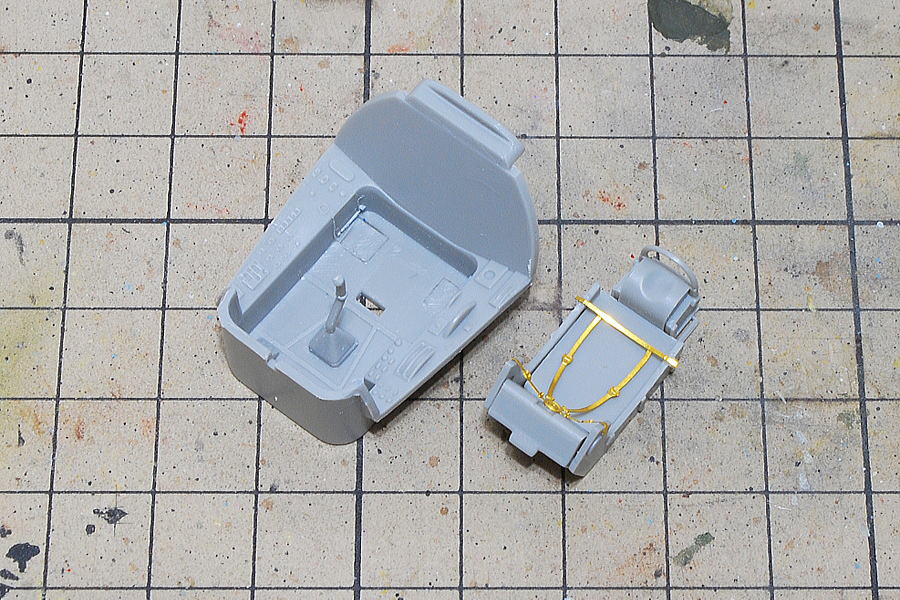 It is good to include the cockpit seat belt in this kit. If there were a decal of the side panel, it would be better.
It is good to include the cockpit seat belt in this kit. If there were a decal of the side panel, it would be better.
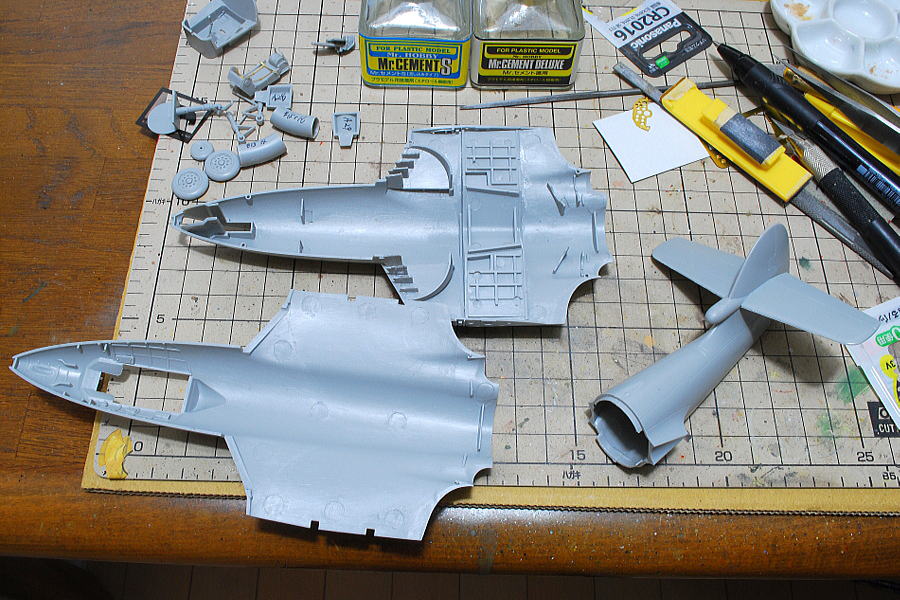 The rear body and half of the wings are separate parts. There are many parts to make the whole body.
The rear body and half of the wings are separate parts. There are many parts to make the whole body.
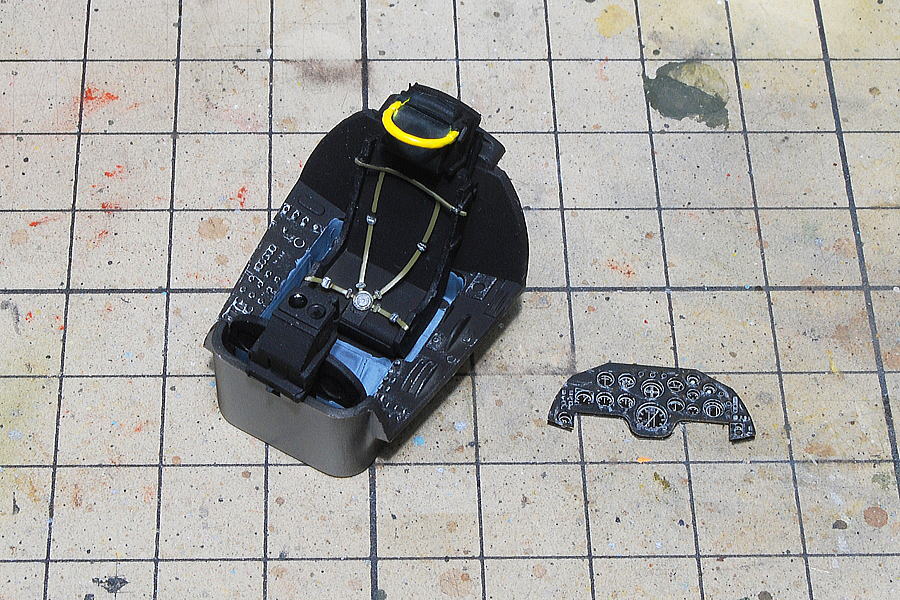 Meters are genuine when I put an attached film. Also, I did dry brushing lightly.
Meters are genuine when I put an attached film. Also, I did dry brushing lightly.
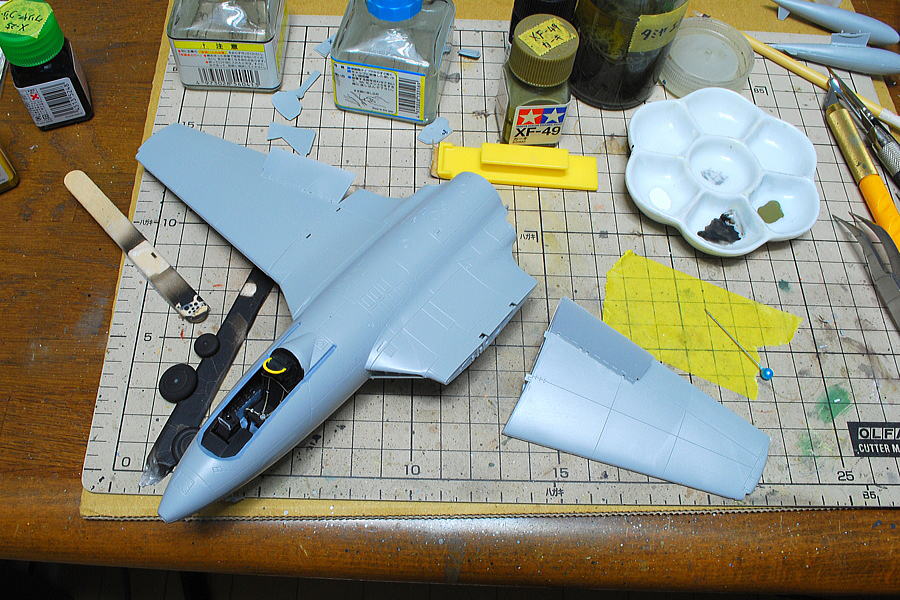 This kit can be built in the folded wing position. And there are some gaps at that point when the wings are straight. I think that the real airplane doesn’t have such gaps. Was anywhere mistaken?
This kit can be built in the folded wing position. And there are some gaps at that point when the wings are straight. I think that the real airplane doesn’t have such gaps. Was anywhere mistaken?
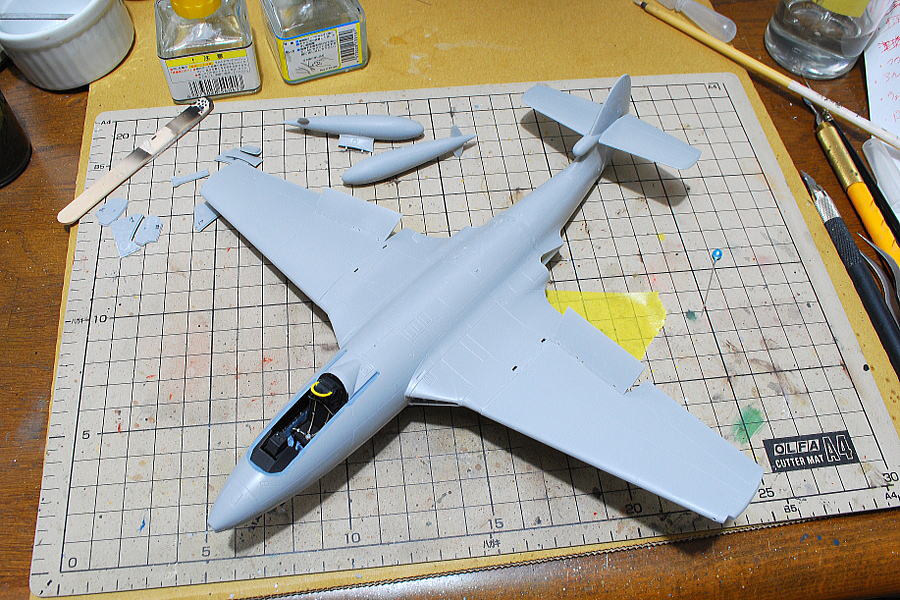 It is a big failure. I’m ashamed to say I have glued the parts to use in a folded state for the usual style. That explains why there are some holes. It is impossible to tear it off because I adhered to them solidly. Unfortunately, I will fill the gap and go ahead as it is. Oh, it is a feeling of weakness…
It is a big failure. I’m ashamed to say I have glued the parts to use in a folded state for the usual style. That explains why there are some holes. It is impossible to tear it off because I adhered to them solidly. Unfortunately, I will fill the gap and go ahead as it is. Oh, it is a feeling of weakness…
(26-August-2016)
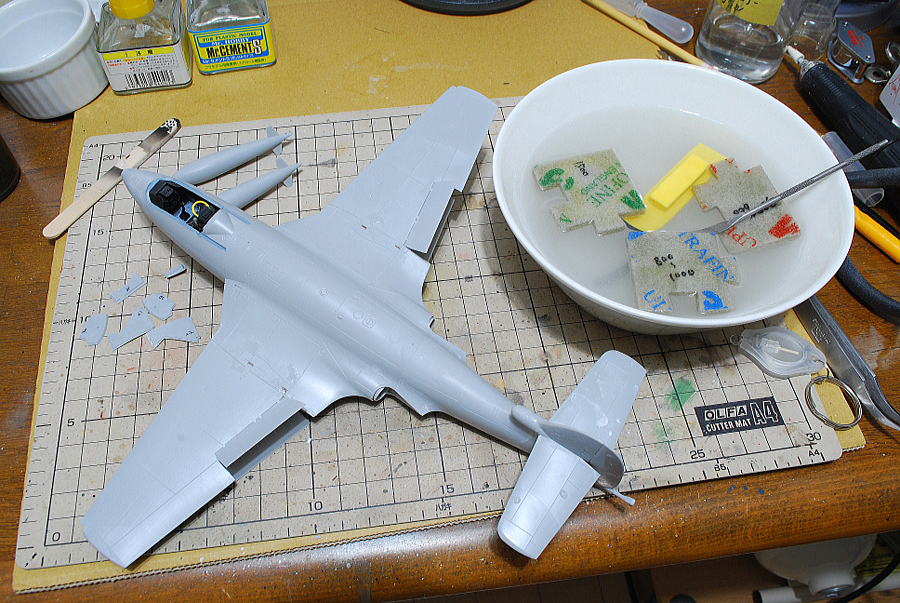 I don’t usually file with sandpaper with water, but I tried to do so this time. There is a surface treatment. Sponge paper soup with plastic powder, with exact file stick.
I don’t usually file with sandpaper with water, but I tried to do so this time. There is a surface treatment. Sponge paper soup with plastic powder, with exact file stick.
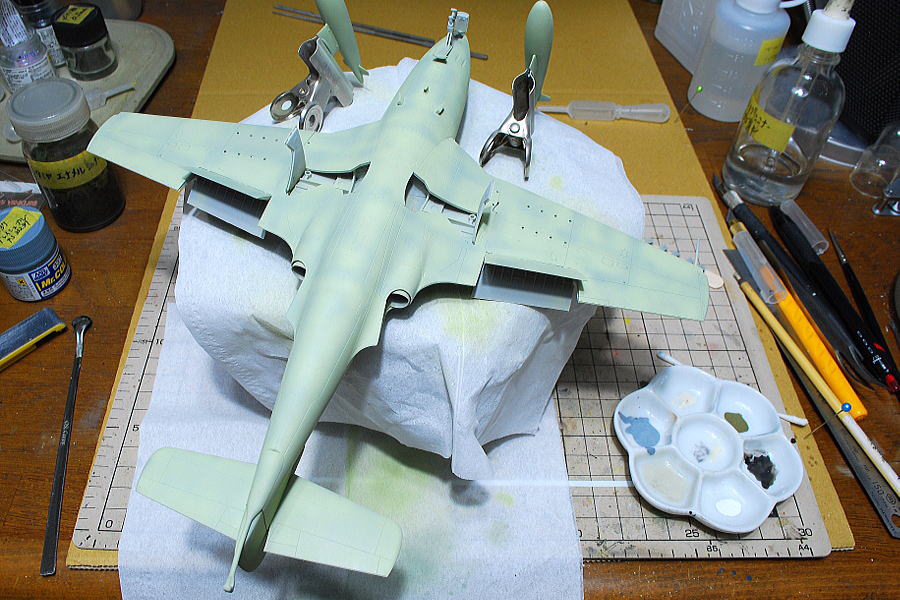 The painting of Duck Egg Green is now completed.
The painting of Duck Egg Green is now completed.
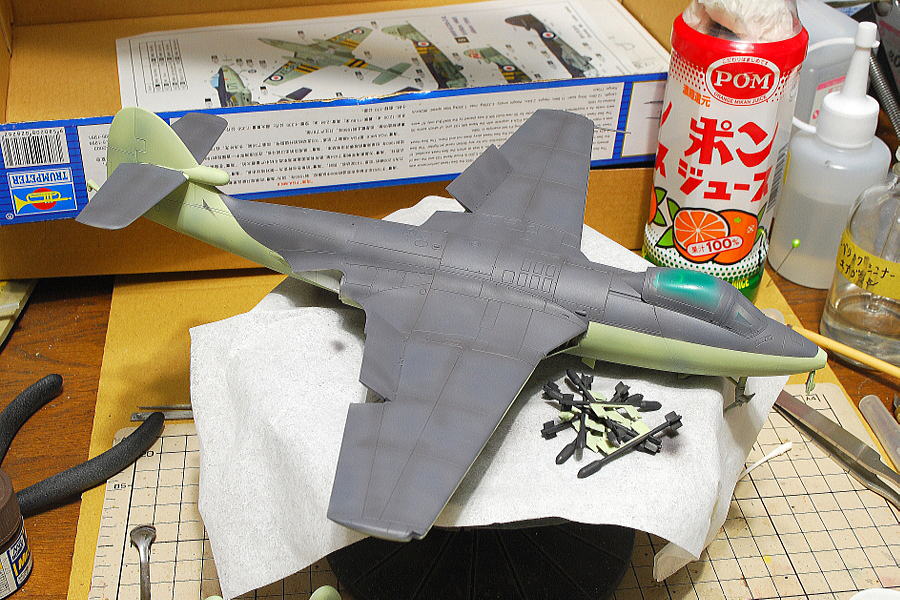 I blew the dark sea gray. I wondered whether more blue was intense when I saw the box painting of the Trumpeter, but after all, It’s gray. Generally, I think military modelers have many gray color stocks.
I blew the dark sea gray. I wondered whether more blue was intense when I saw the box painting of the Trumpeter, but after all, It’s gray. Generally, I think military modelers have many gray color stocks.
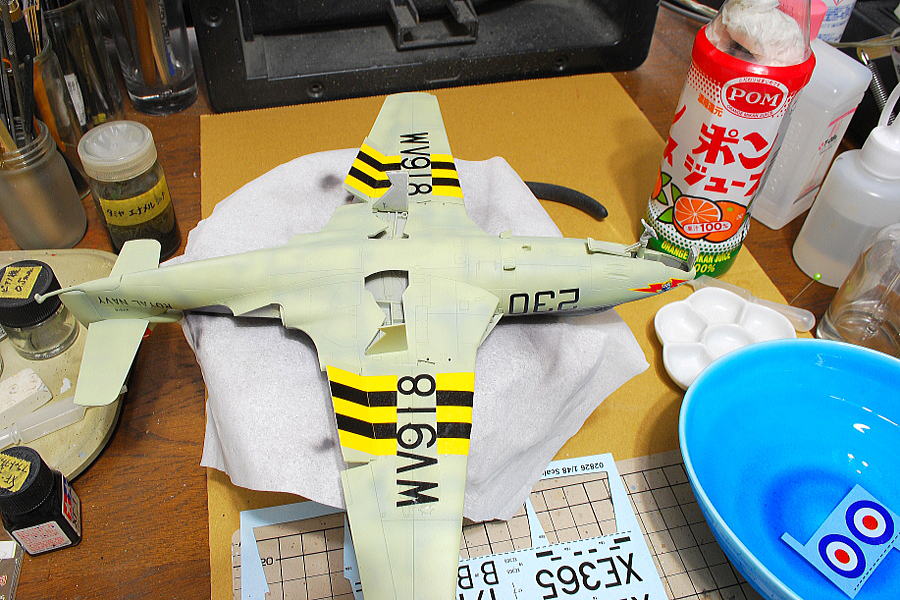 On the backside, I made a mistake again. Though some backsides must paint in the dark sea gray, I painted all in duck egg green. It was hot that day, and am I absent-minded? I am wondering if I will modify it now or not. This is a big difference.
On the backside, I made a mistake again. Though some backsides must paint in the dark sea gray, I painted all in duck egg green. It was hot that day, and am I absent-minded? I am wondering if I will modify it now or not. This is a big difference.
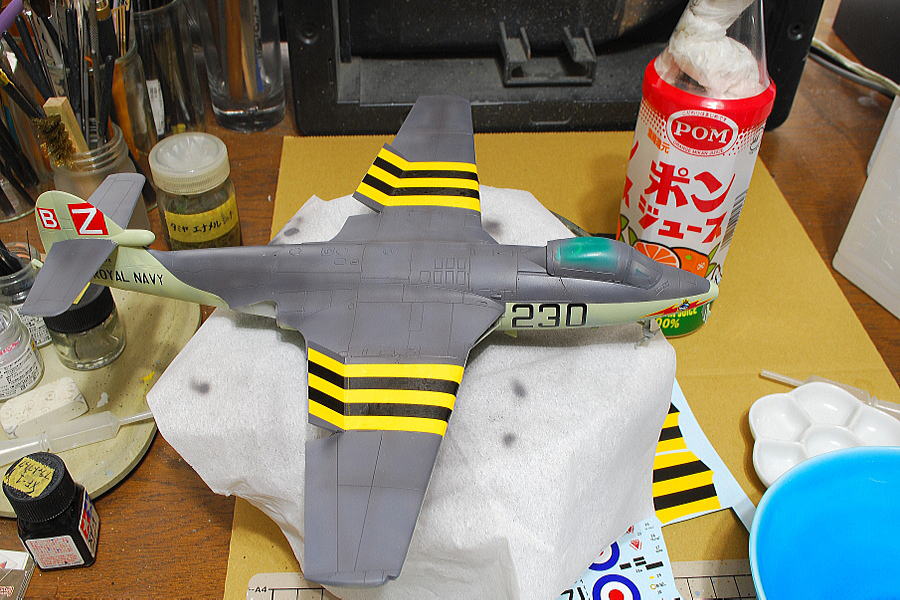 This kit decal is terrific. The Stripe decal is required delicate adjusting. I adjusted the position on the front and back together; after that, I used the mark softer. It was less of a failure. I’m still poor at sticking giant decals…
This kit decal is terrific. The Stripe decal is required delicate adjusting. I adjusted the position on the front and back together; after that, I used the mark softer. It was less of a failure. I’m still poor at sticking giant decals…
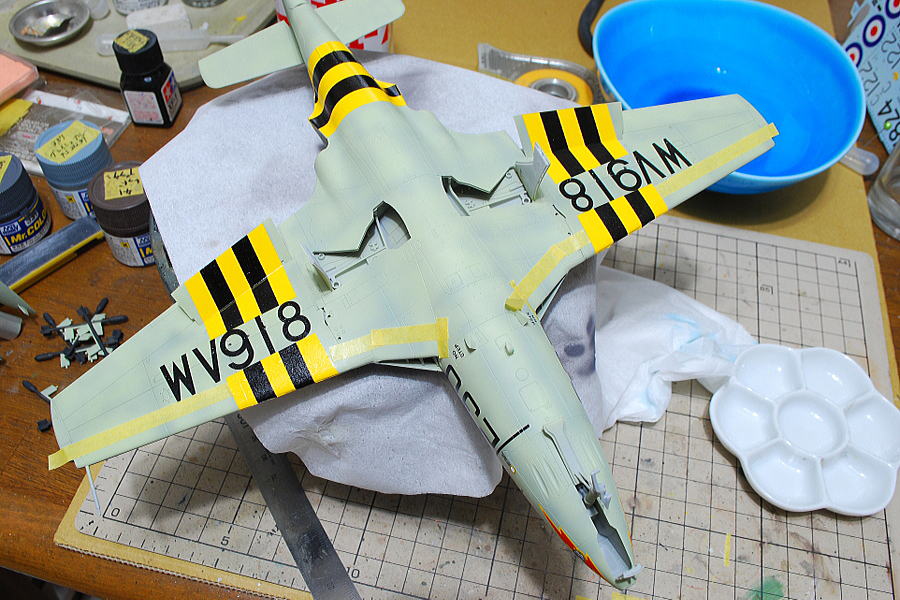 After all, the unpainted part of the fuselage underside recovery with the airbrush was challenging after pasting all the decals. I try a brush painting—a recovery in practice.
After all, the unpainted part of the fuselage underside recovery with the airbrush was challenging after pasting all the decals. I try a brush painting—a recovery in practice.
(28-August-2016)
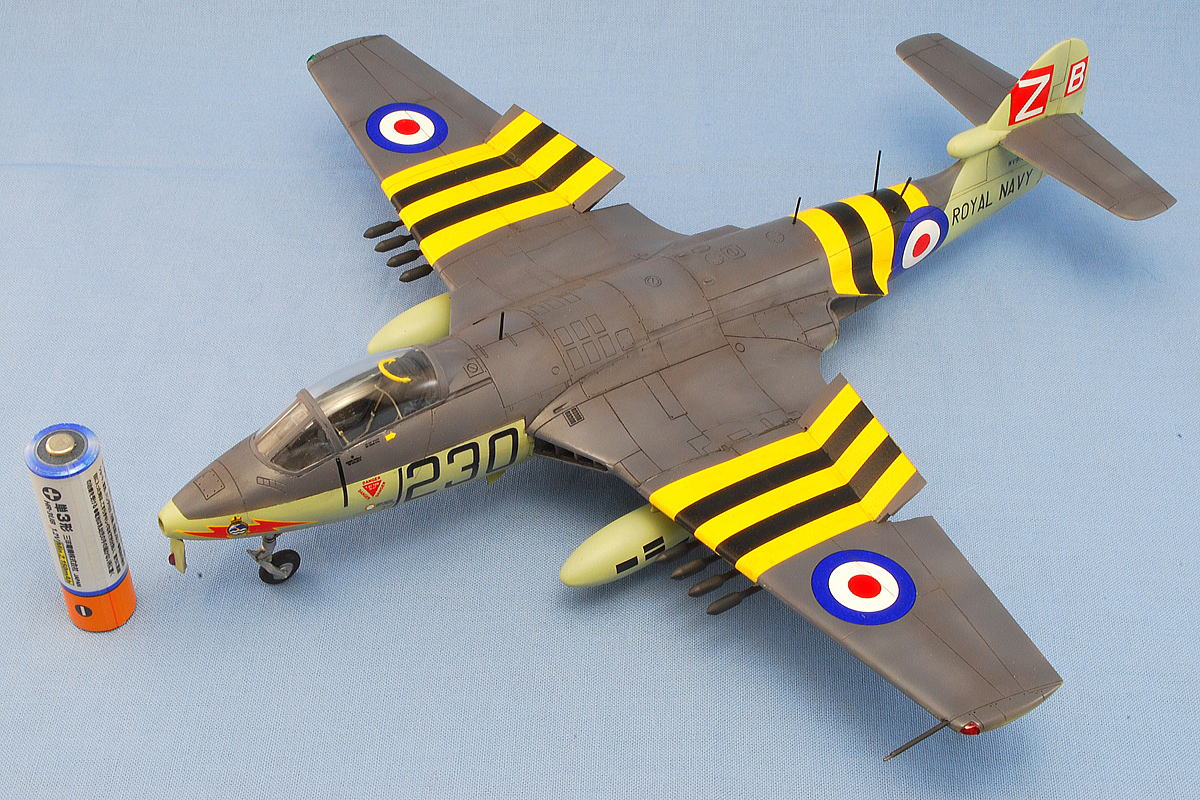 Hawker Sea Hawk is a carrier-based fighter of the Royal Navy, operated after the Second World War.
Hawker Sea Hawk is a carrier-based fighter of the Royal Navy, operated after the Second World War.
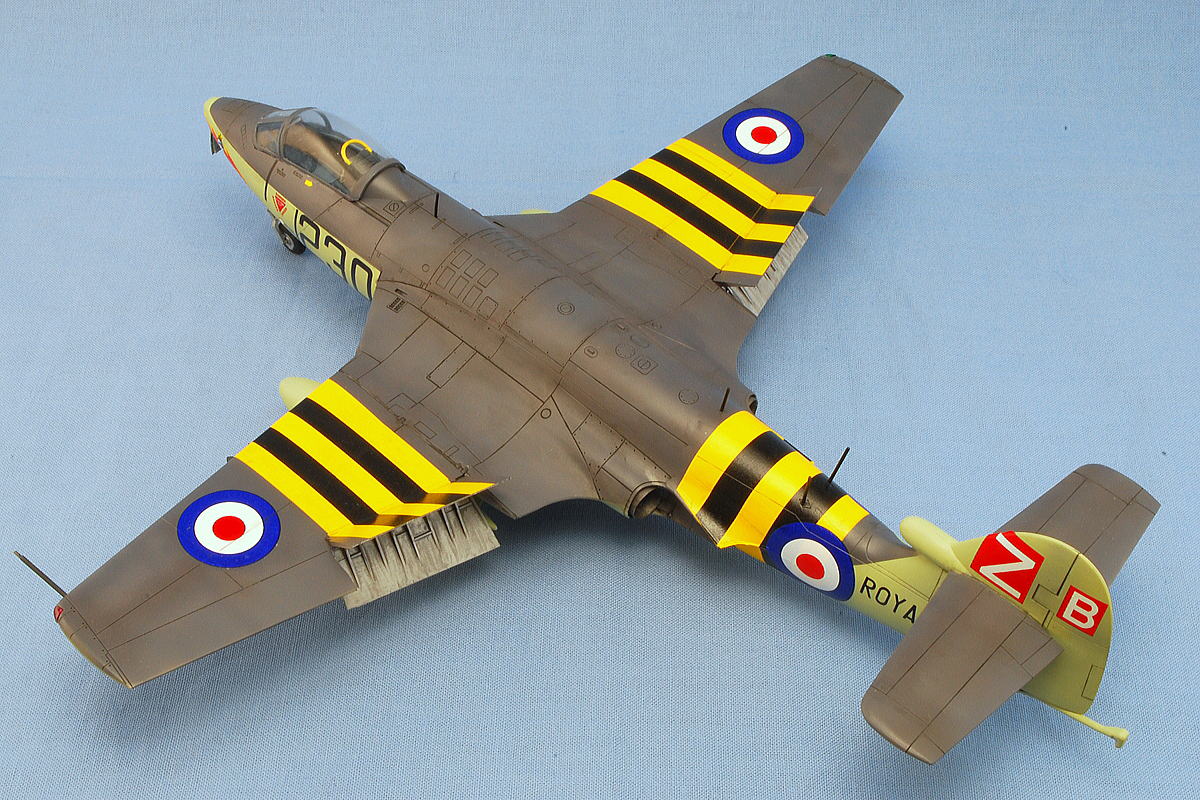 As for the characteristic of this jet, the engine nozzles are located at the root of the main wing. They are on both sides, but the jet engine is one.
As for the characteristic of this jet, the engine nozzles are located at the root of the main wing. They are on both sides, but the jet engine is one.
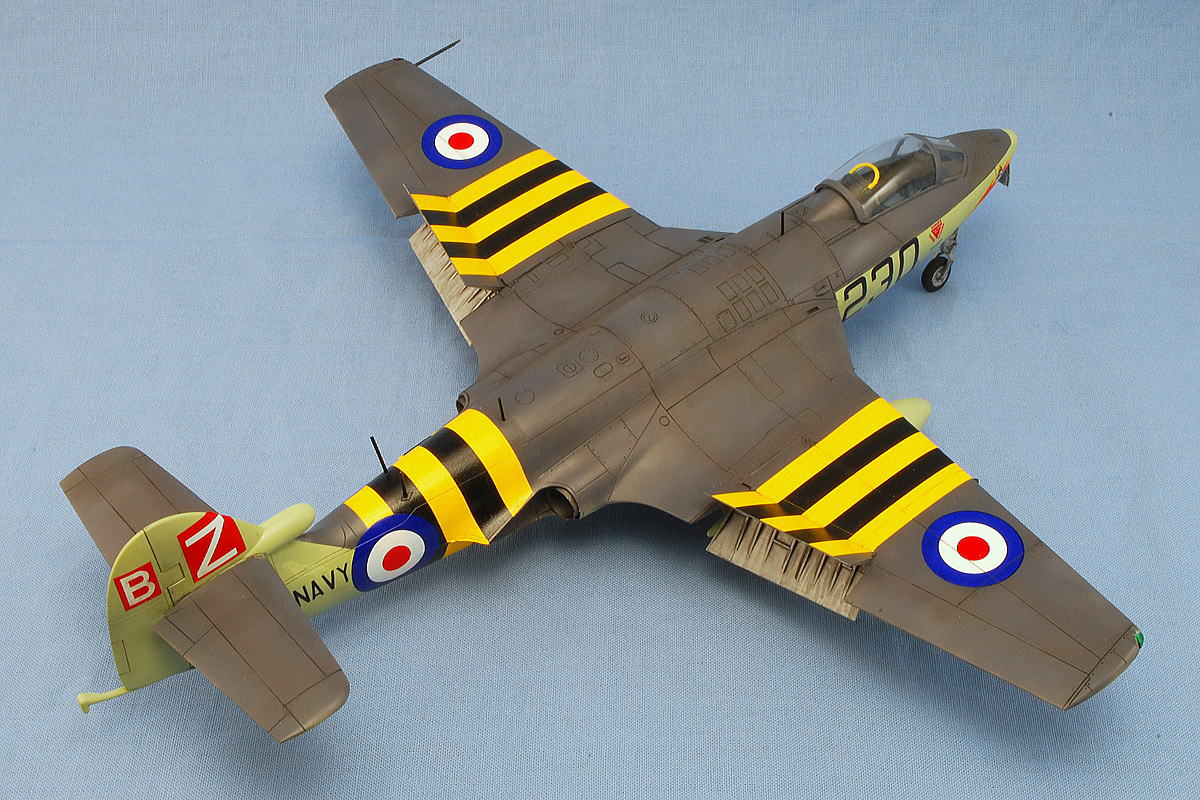 FGA6 is a version-up, and the engine has been strengthened compared with the early-stage assignment.
FGA6 is a version-up, and the engine has been strengthened compared with the early-stage assignment.
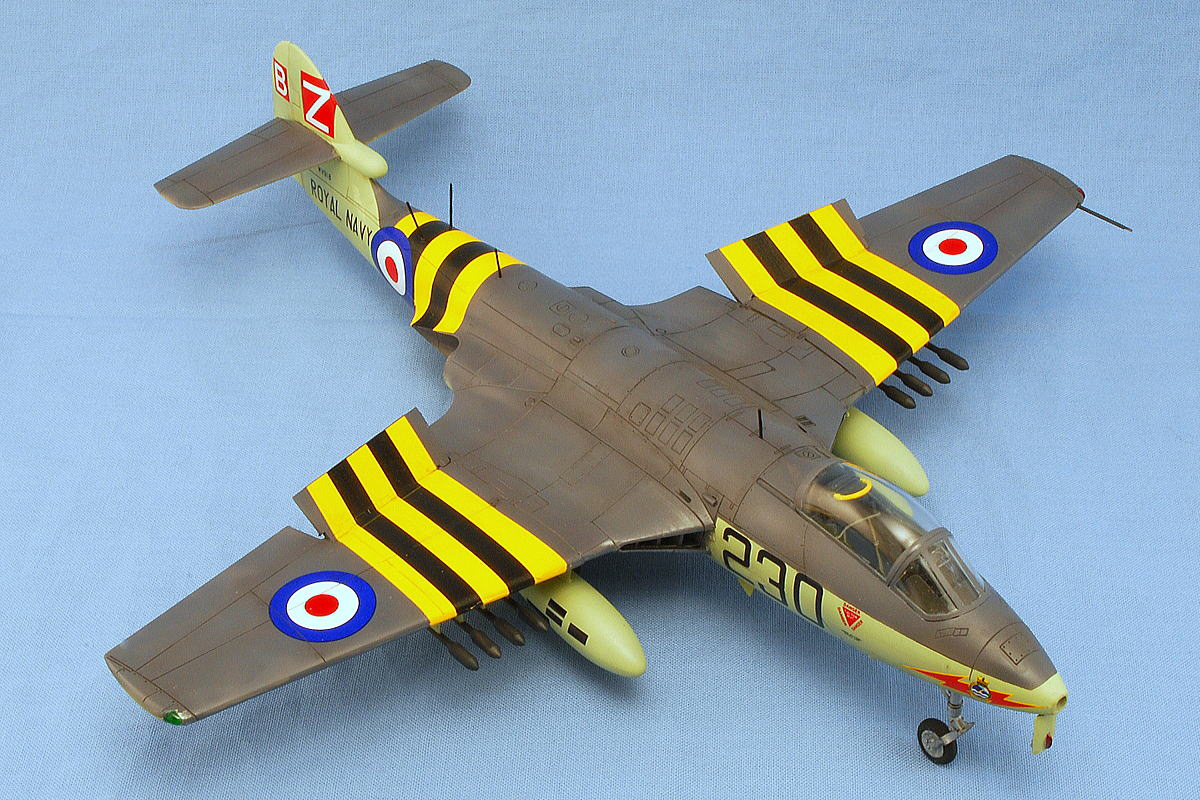 4 x 20mm cannons are equipped. This Seahawk handles rockets, so it was used as a fighter bomber rather than a pure fighter.
4 x 20mm cannons are equipped. This Seahawk handles rockets, so it was used as a fighter bomber rather than a pure fighter.
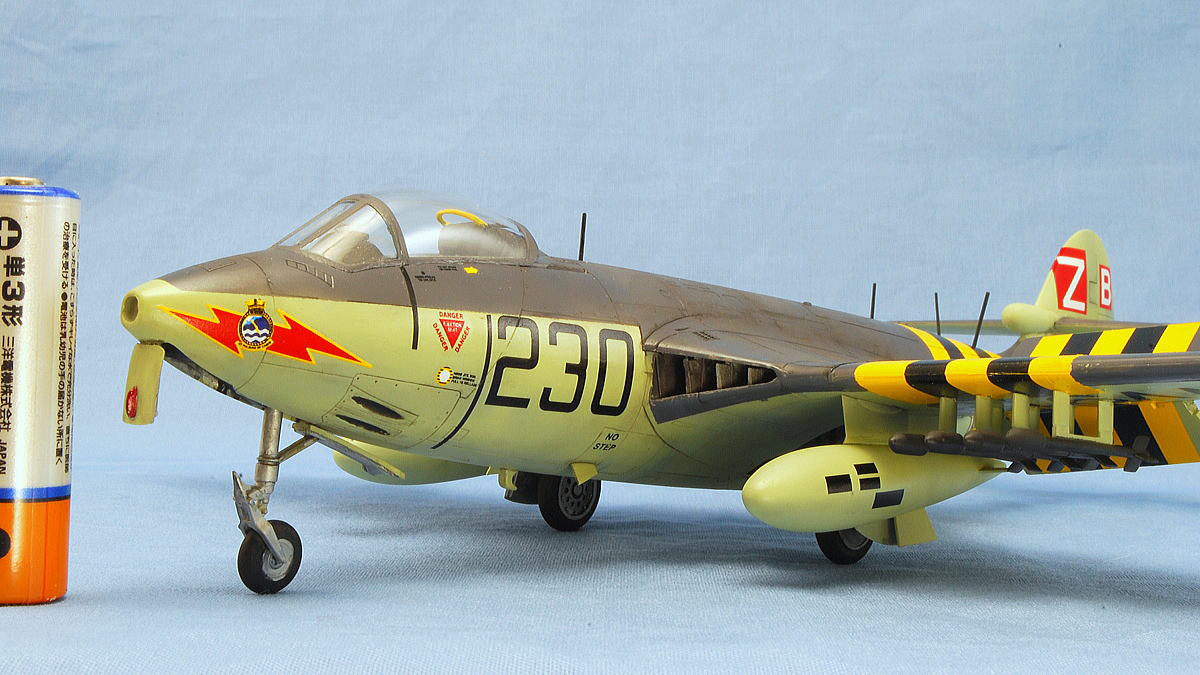 Seahawk is participating in combat in the Suez Crisis. Since the ten squadrons participated, and one squadron has 20 aircraft, it organized 200 aircraft. It’s a considerable force.
Seahawk is participating in combat in the Suez Crisis. Since the ten squadrons participated, and one squadron has 20 aircraft, it organized 200 aircraft. It’s a considerable force.
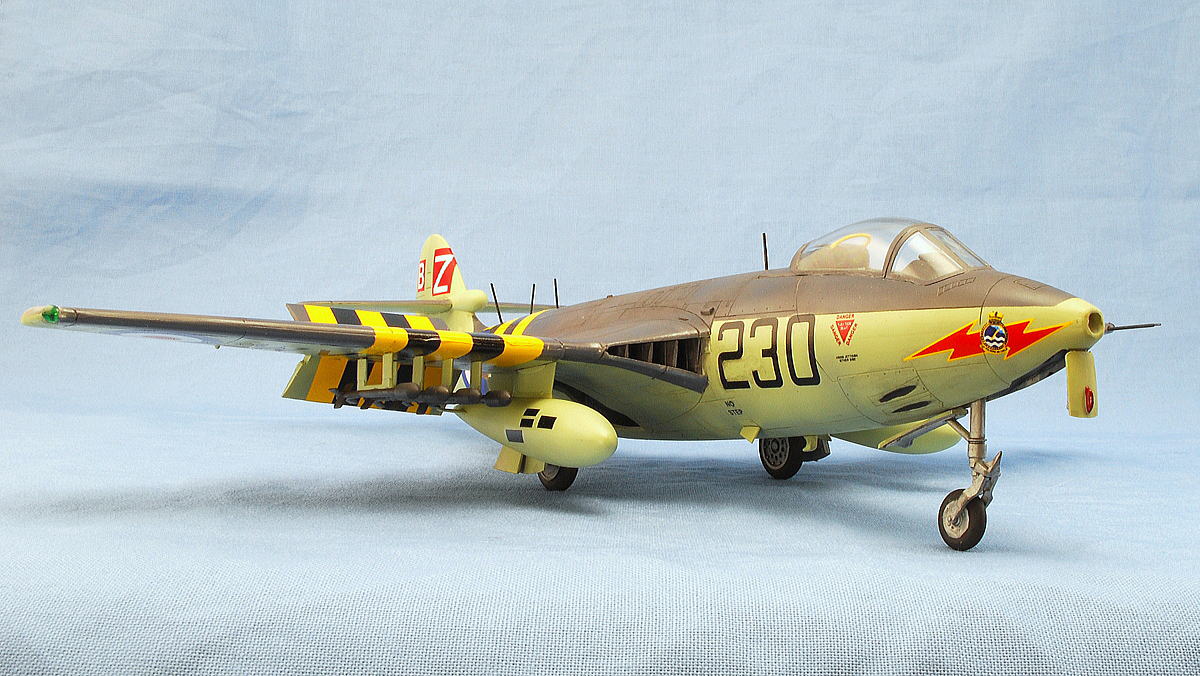 Though there is no mention of a manual, you should put a weight on the front.
Though there is no mention of a manual, you should put a weight on the front.
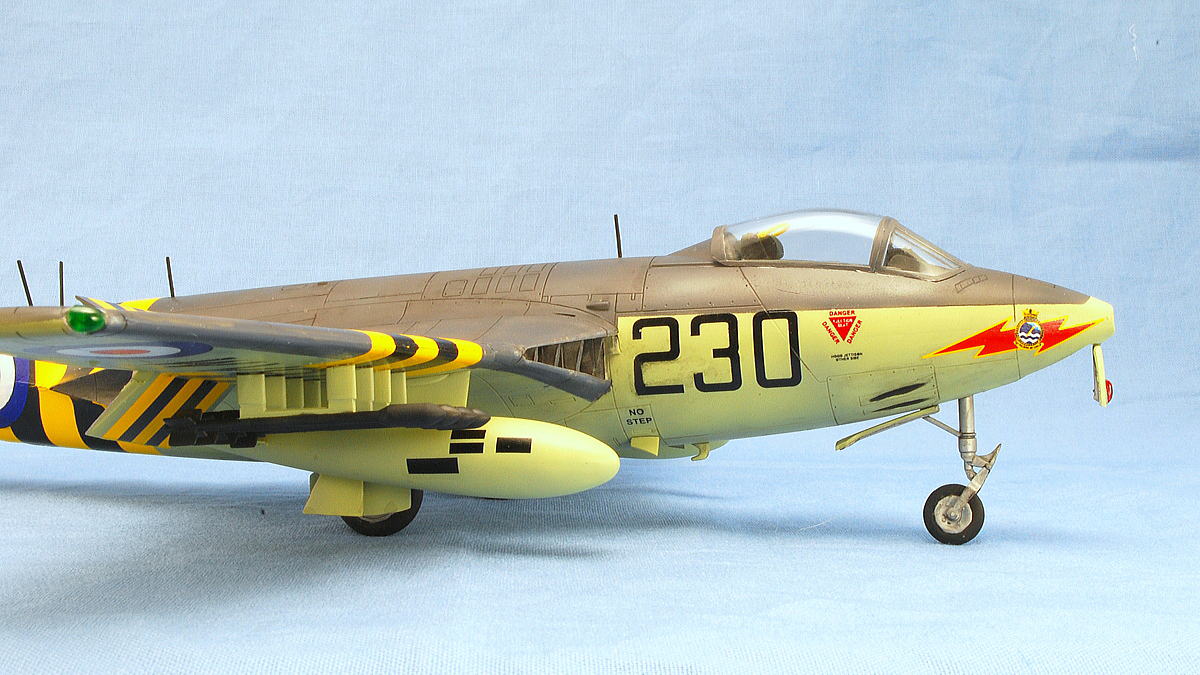 Marking is WV918/230-Z-B, 810Sqn, HMS Albion 1956.
Marking is WV918/230-Z-B, 810Sqn, HMS Albion 1956.
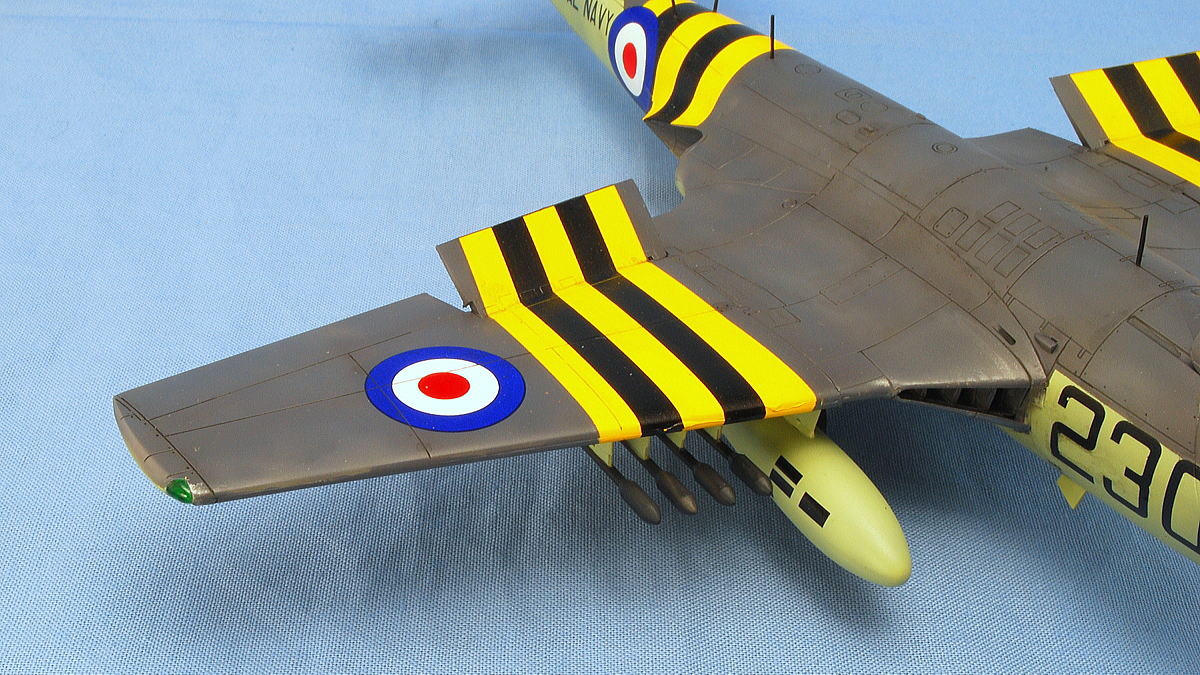 They are painted clear green because the wing-tip light is a clear part.
They are painted clear green because the wing-tip light is a clear part.
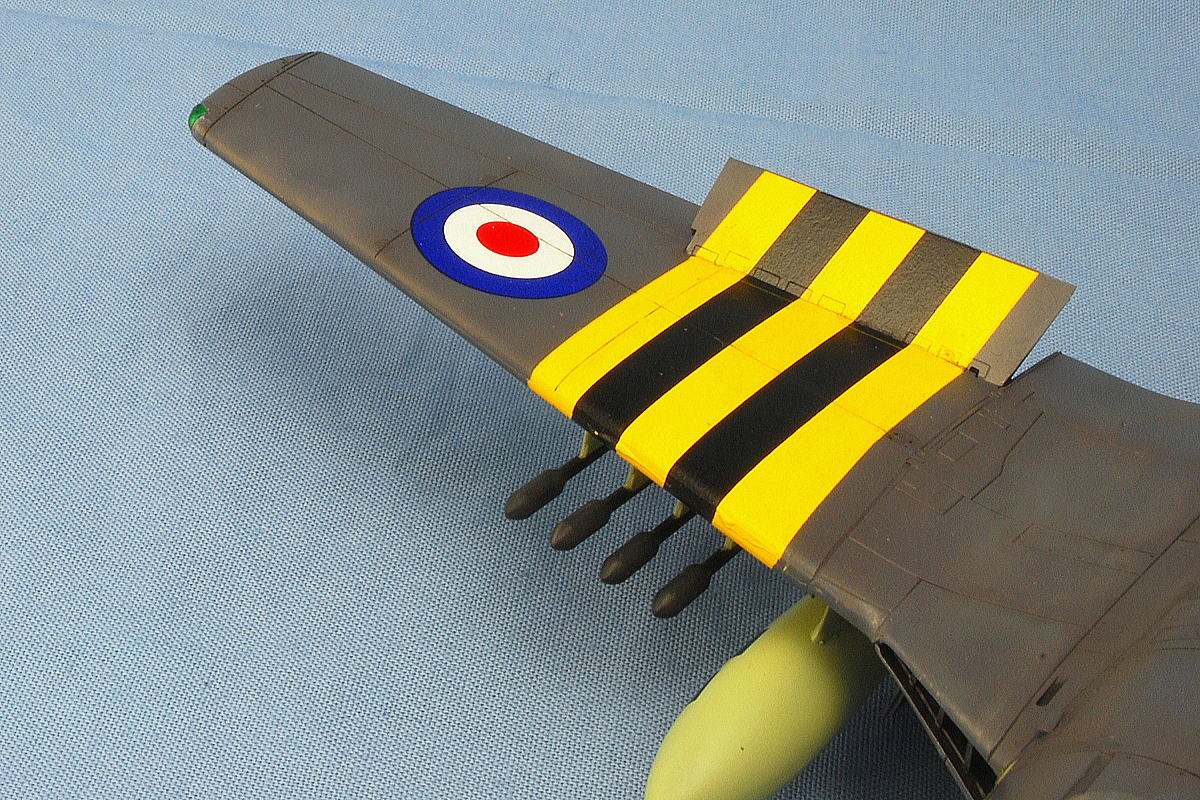 Because it is a carrier-based plane, I could build even the wing folded state. The folded wing has a small space.
Because it is a carrier-based plane, I could build even the wing folded state. The folded wing has a small space.
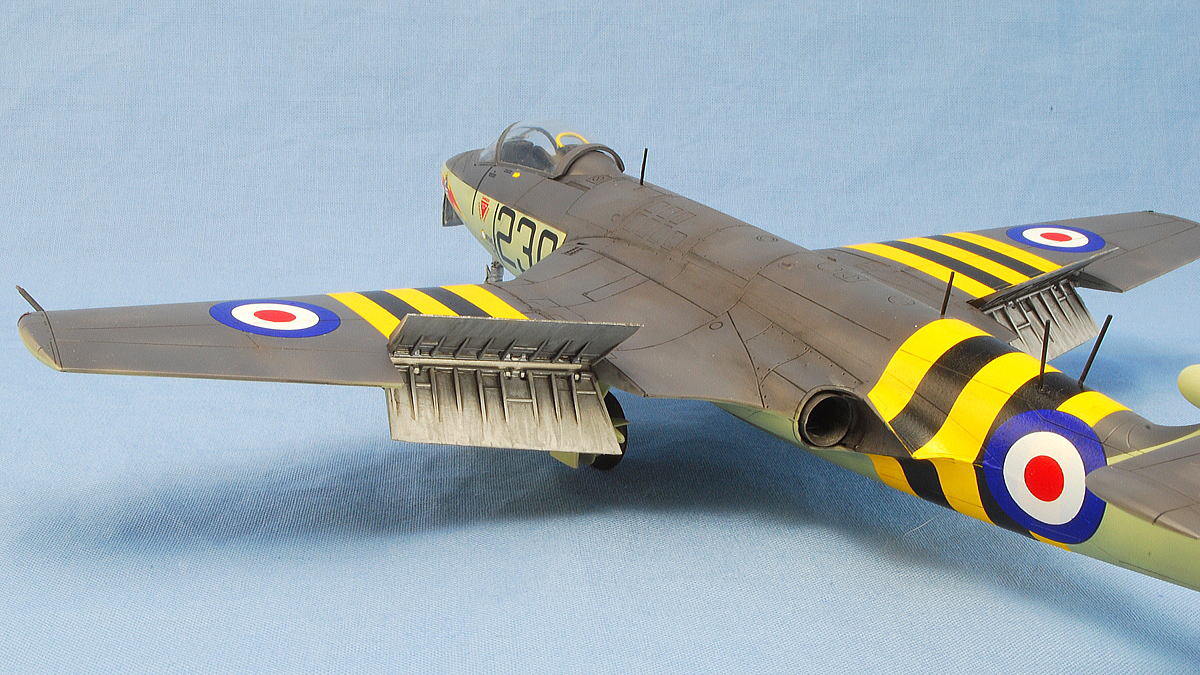 I built the flap opened state. I’m not sure which is better, looking close or open.
I built the flap opened state. I’m not sure which is better, looking close or open.
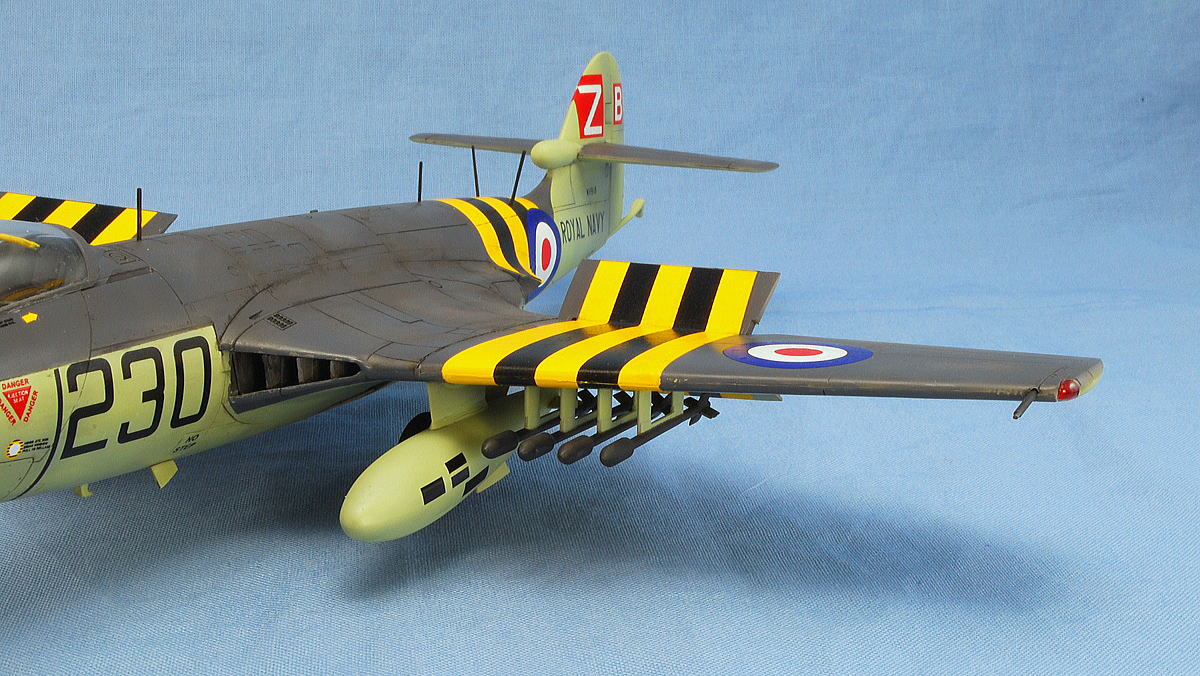 There are a lot of antennas, and attention is necessary to handle them.
There are a lot of antennas, and attention is necessary to handle them.
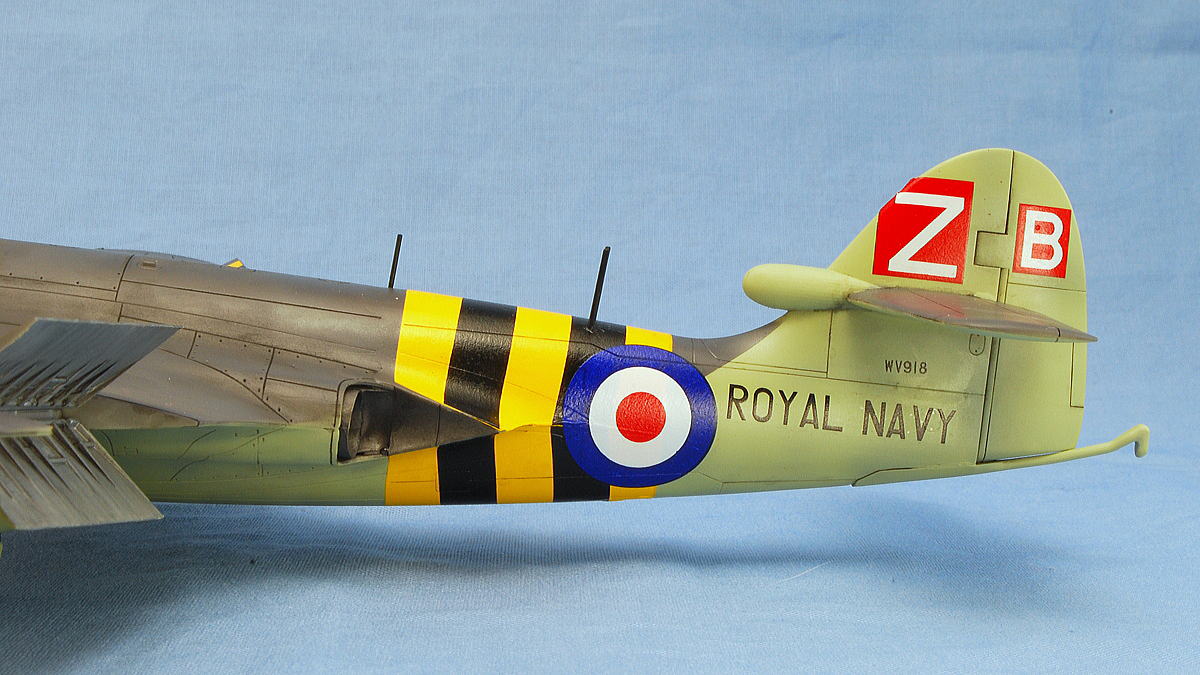 It was enjoyable to paste the beautiful decals. The Roundel white area is a little thin?
It was enjoyable to paste the beautiful decals. The Roundel white area is a little thin?
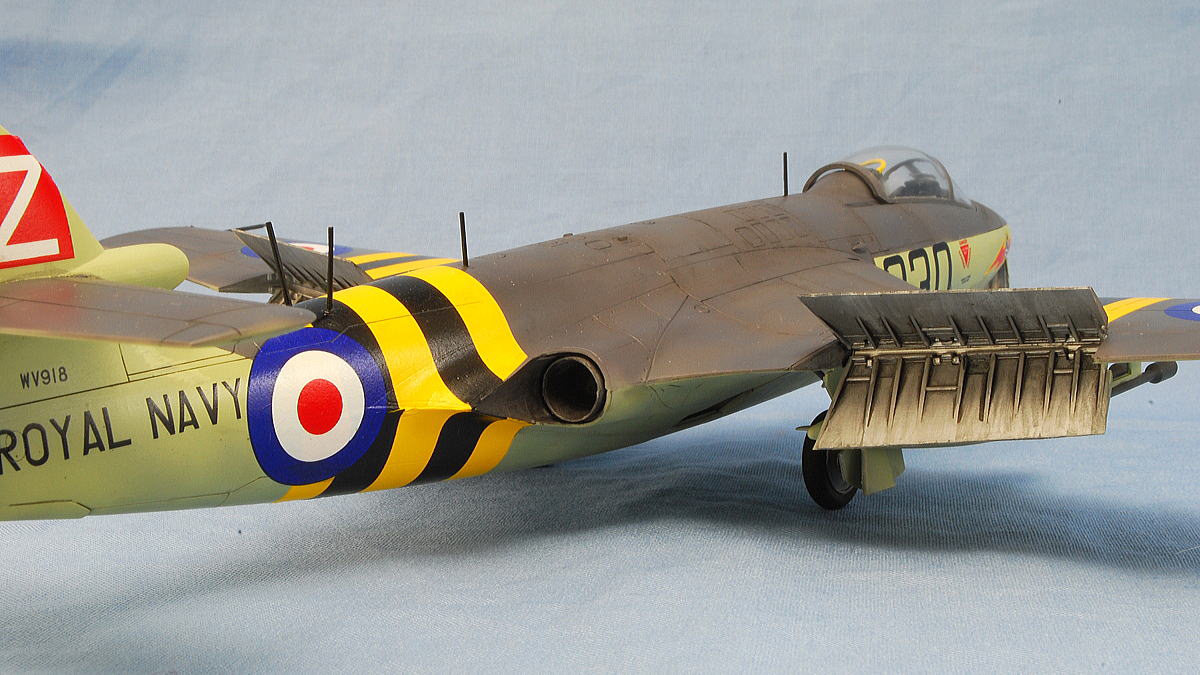 I like not to make a weathering on yellow and black stripes aircraft identification marks so much.
I like not to make a weathering on yellow and black stripes aircraft identification marks so much.
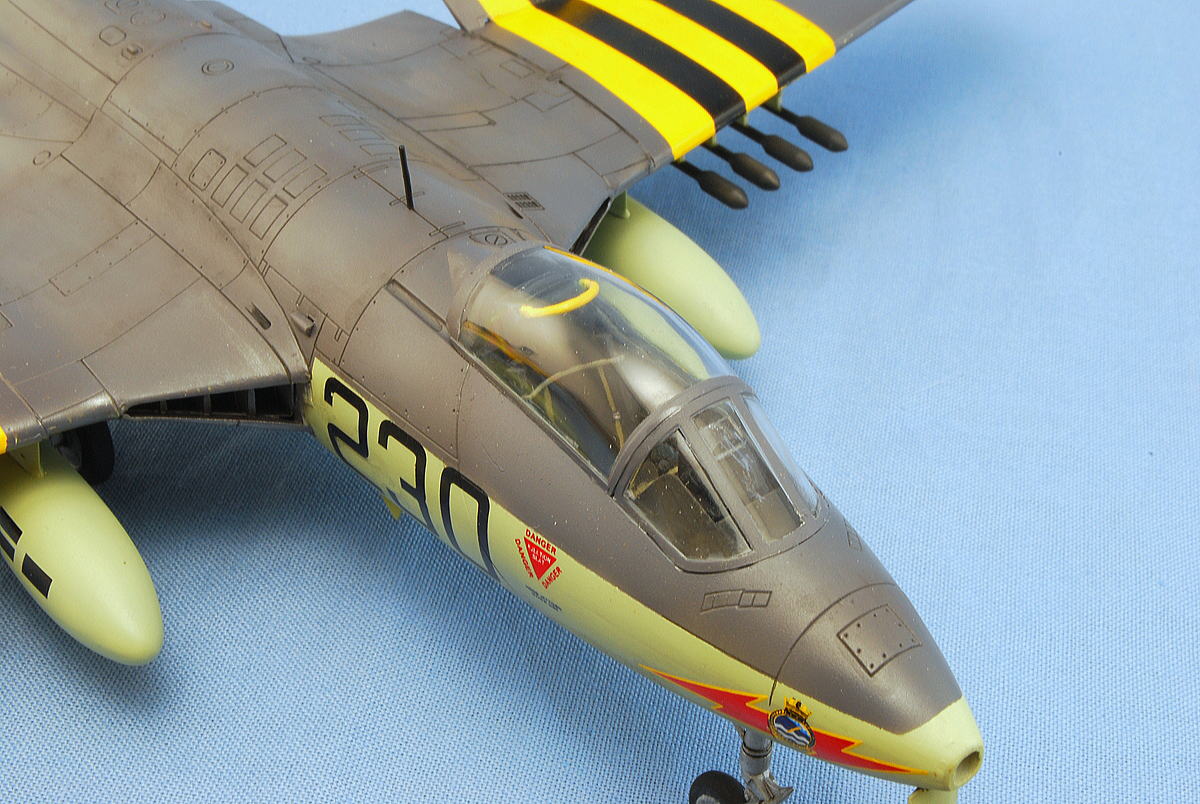 We can finish quite precisely without buying the other materials if you like the attached photo-etched parts and the small meter panel sheet.
We can finish quite precisely without buying the other materials if you like the attached photo-etched parts and the small meter panel sheet.
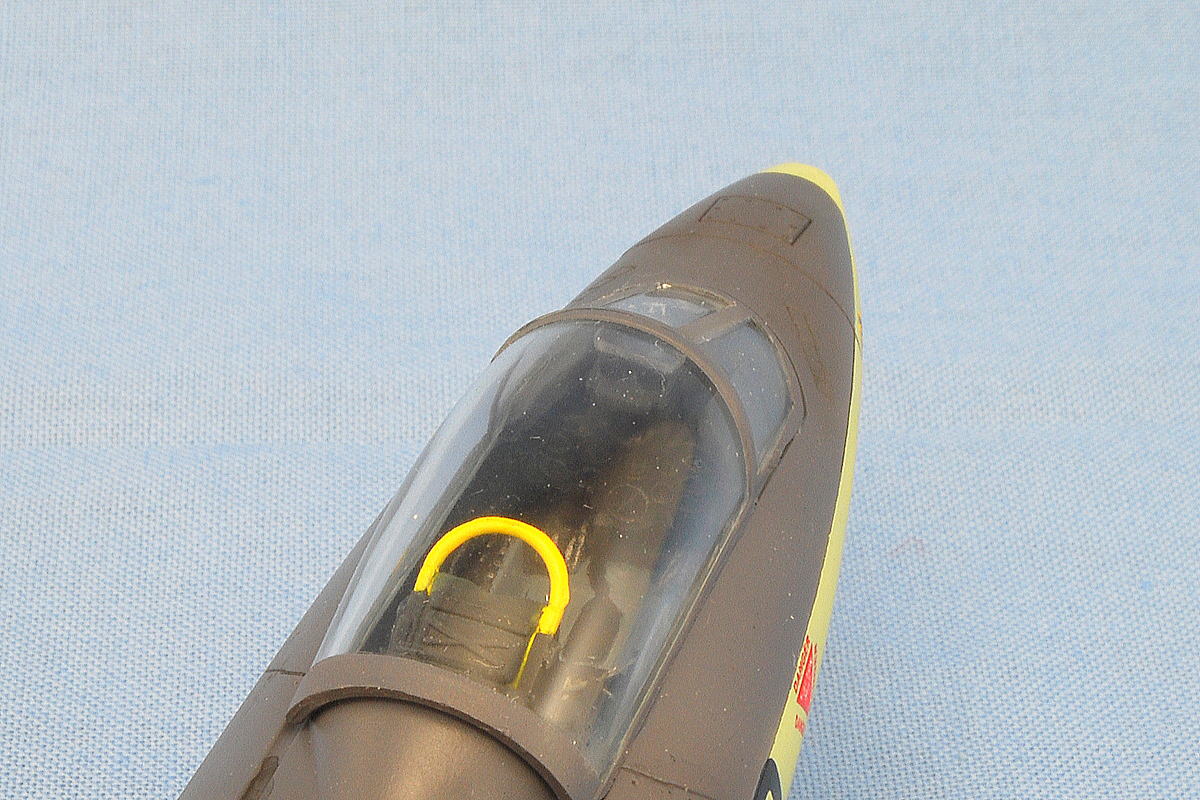 If it’s over a canopy, detailed cockpit panels reflect diffusely and are challenging to see.
If it’s over a canopy, detailed cockpit panels reflect diffusely and are challenging to see.
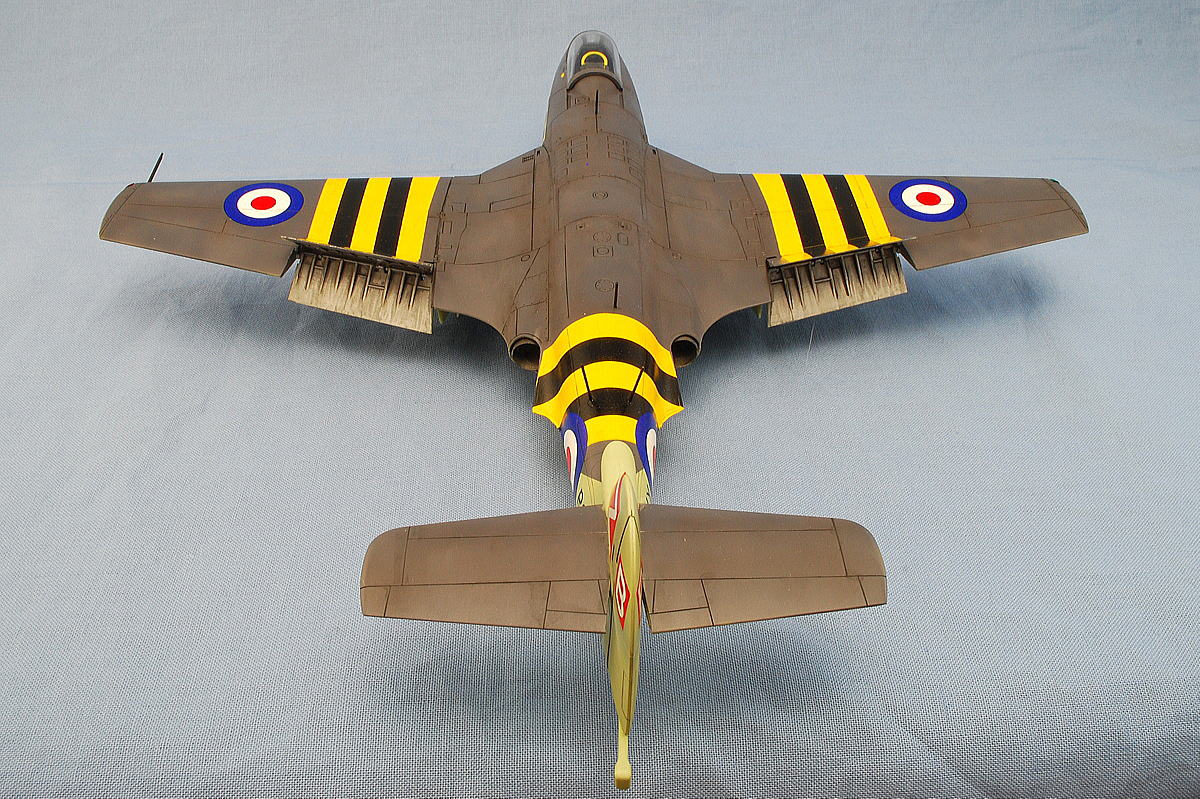 It is somewhat similar to flying squirrels.
It is somewhat similar to flying squirrels.
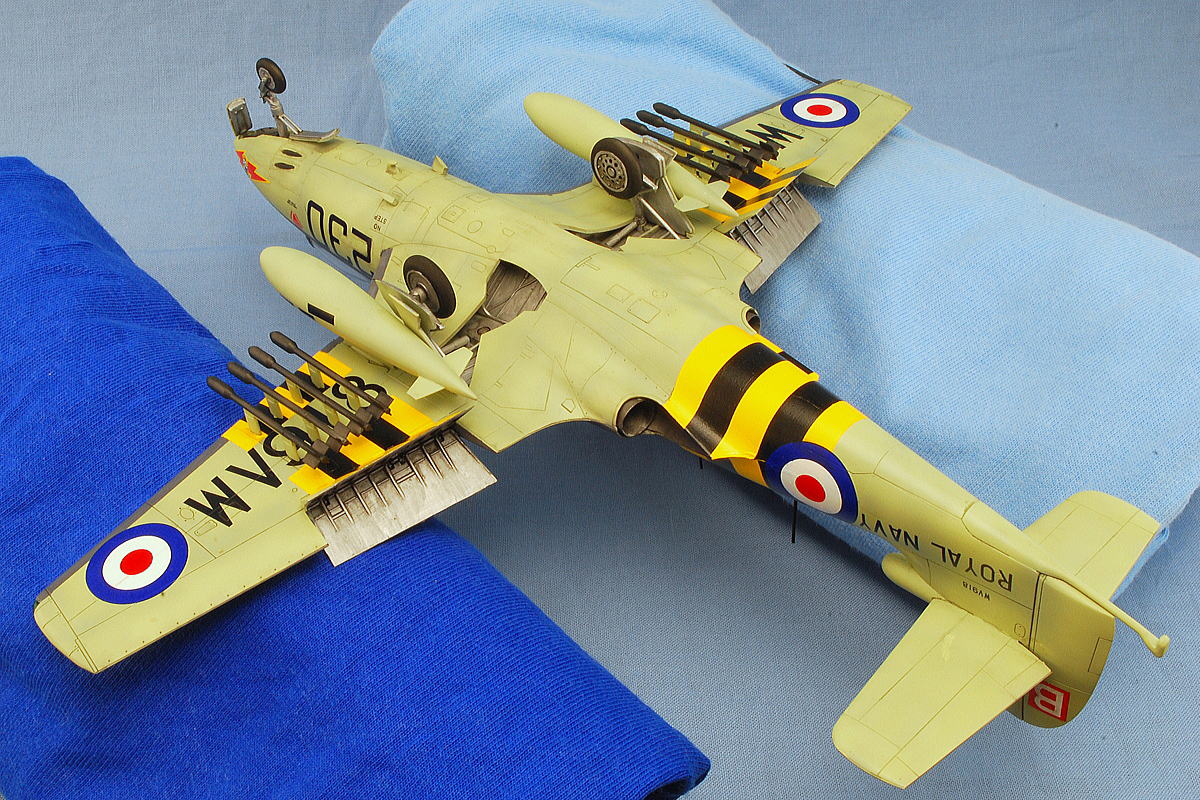 Bright and clean underside. I like the color Duck Egg Green.
Bright and clean underside. I like the color Duck Egg Green.
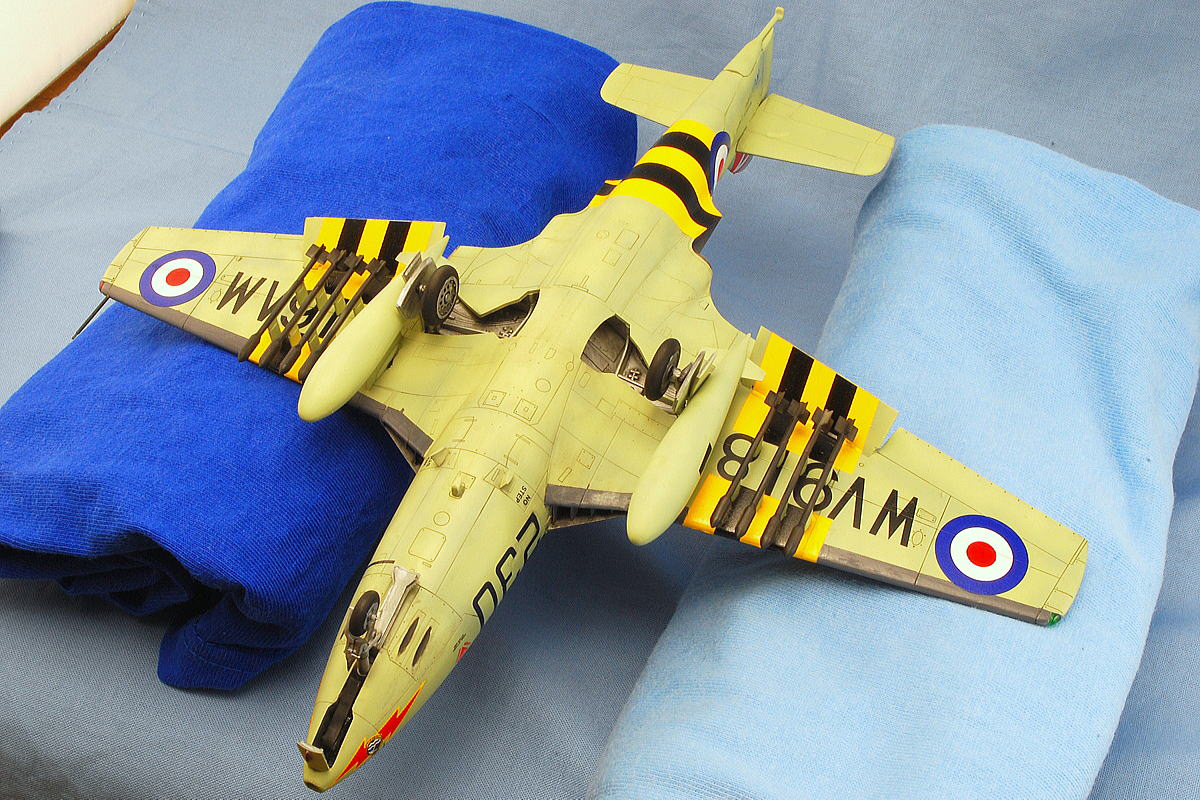 I attached eight rockets and two belly tanks.
I attached eight rockets and two belly tanks.
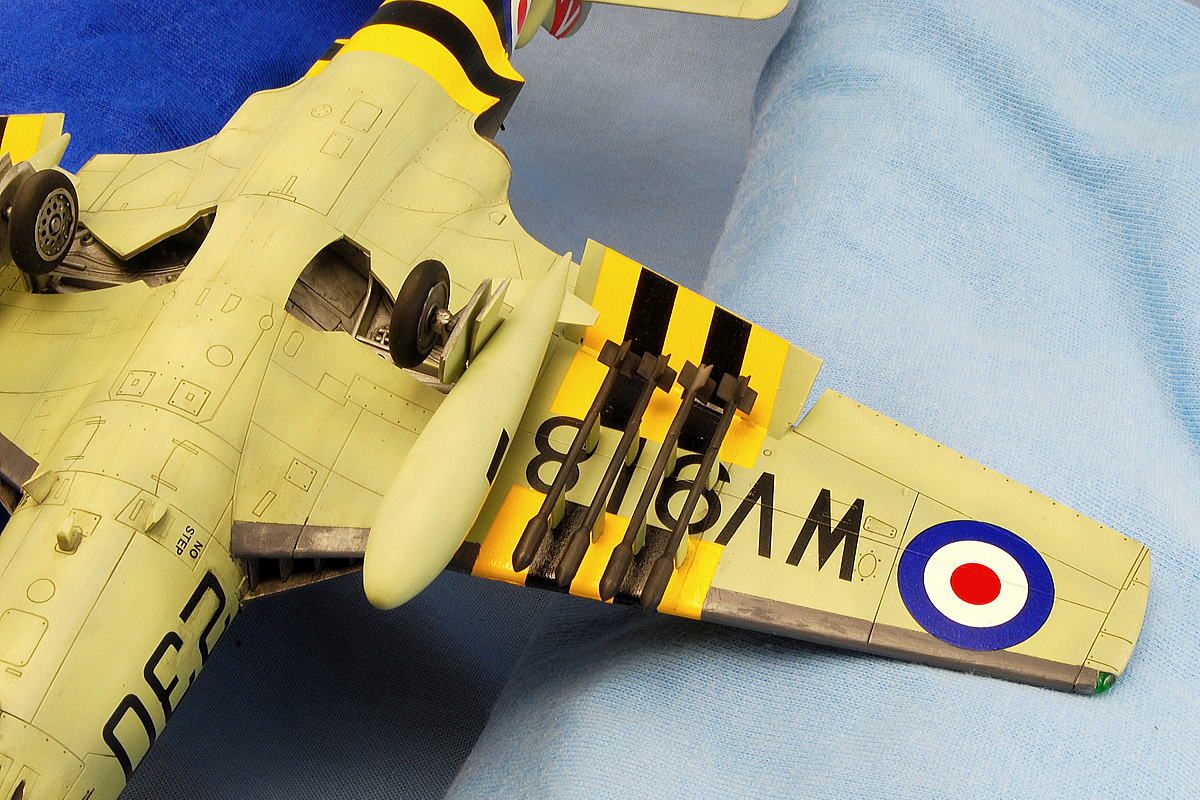 I think that recovery was quite well, though I forgot to paint with the gray of the main wing undersurface.
I think that recovery was quite well, though I forgot to paint with the gray of the main wing undersurface.
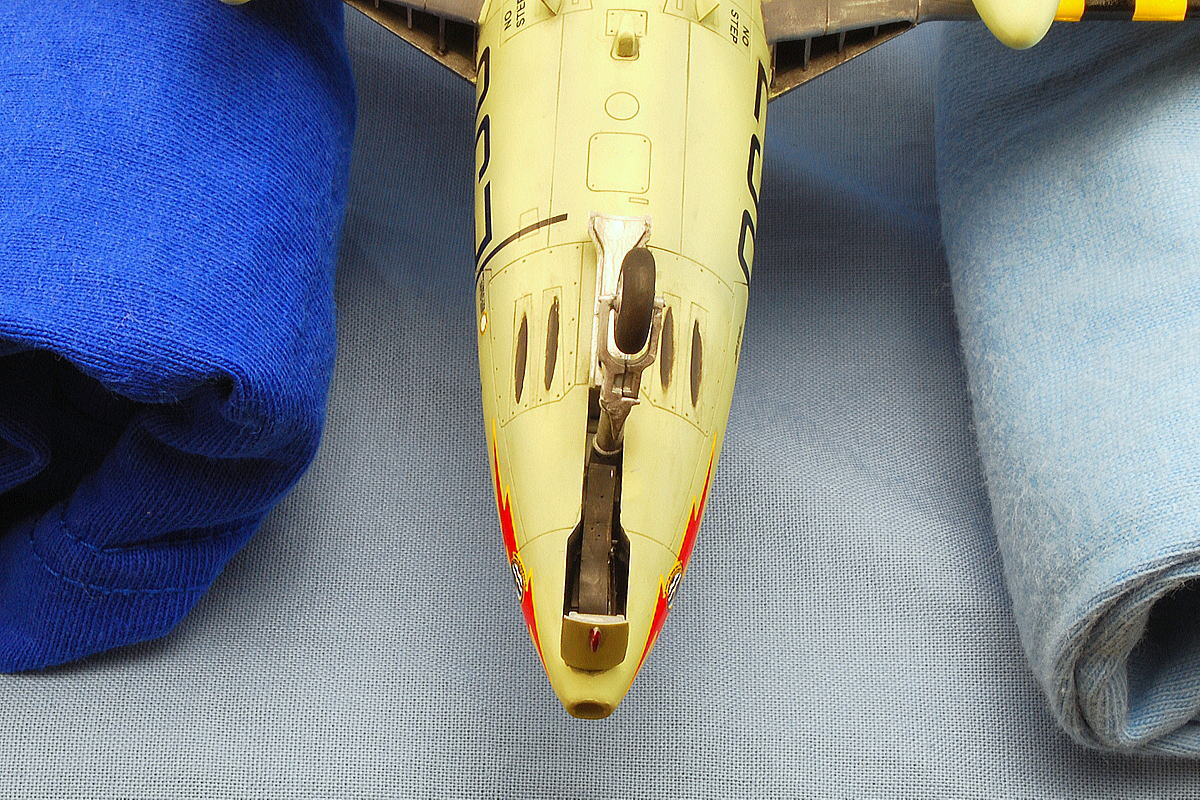 A weight was installed around the cockpit. It was a delicate balance. I poked it a little, falling to the rear. I added weight to the landing compartment of the nose. I painted this part mat black. The back of the body is considerably heavy.
A weight was installed around the cockpit. It was a delicate balance. I poked it a little, falling to the rear. I added weight to the landing compartment of the nose. I painted this part mat black. The back of the body is considerably heavy.
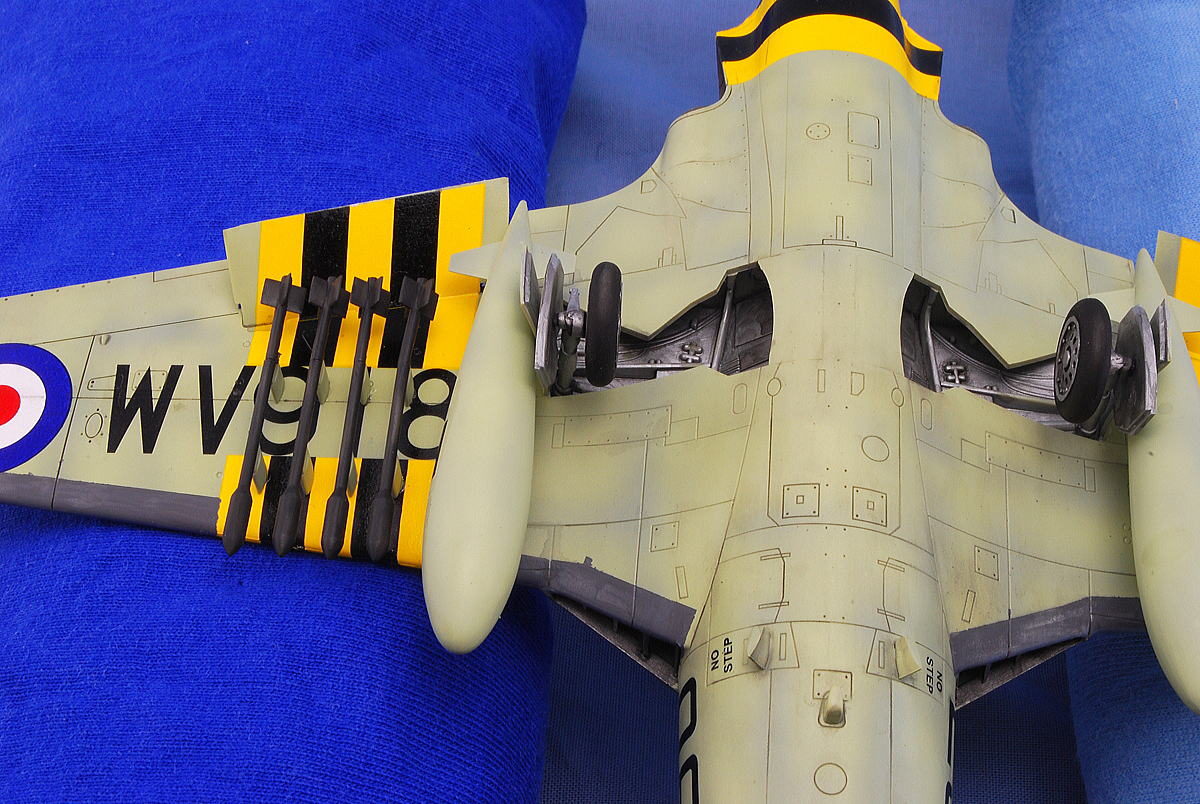
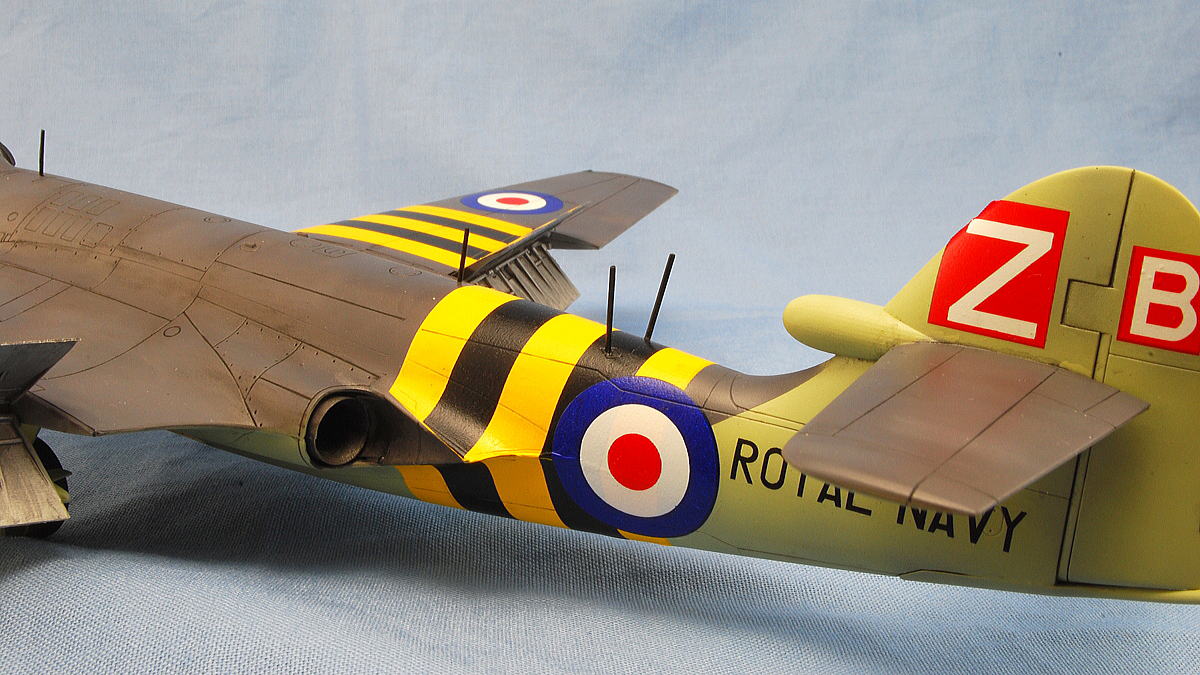 The engine nozzles are located at the root of the main wing. There seemed to be a vertical line, and a step was big, so I filled it with putty and made it smooth.
The engine nozzles are located at the root of the main wing. There seemed to be a vertical line, and a step was big, so I filled it with putty and made it smooth.
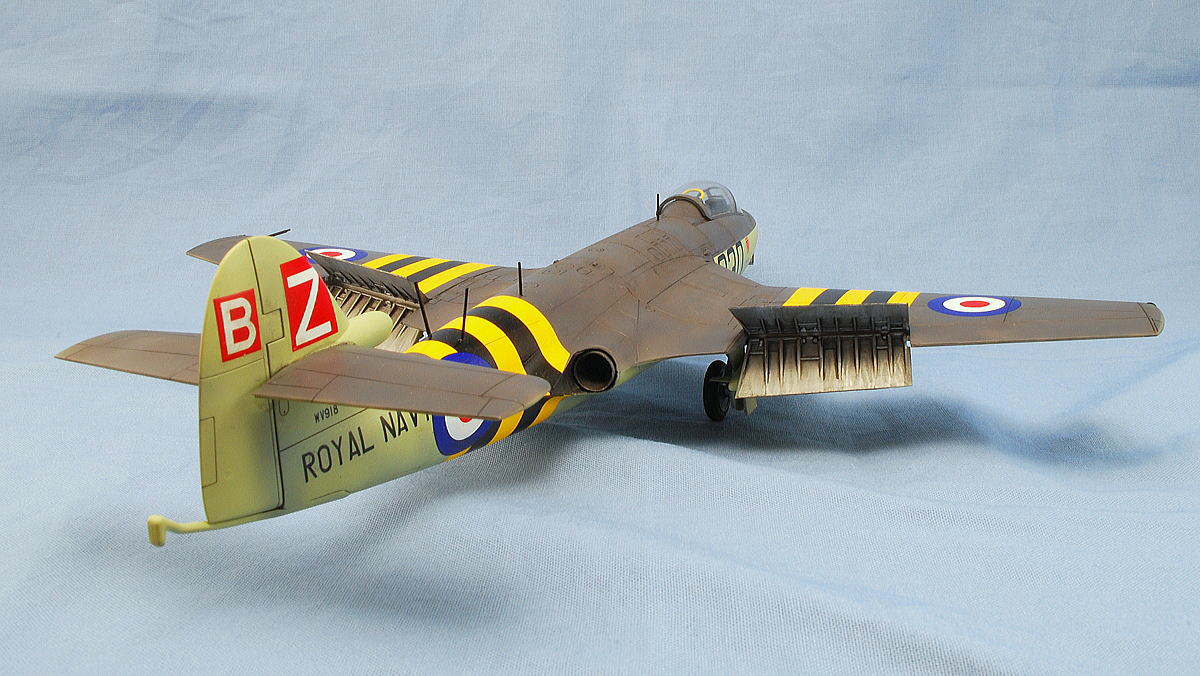 The British fighters have a beautiful body line like Spitfire and Hurricane.
The British fighters have a beautiful body line like Spitfire and Hurricane.
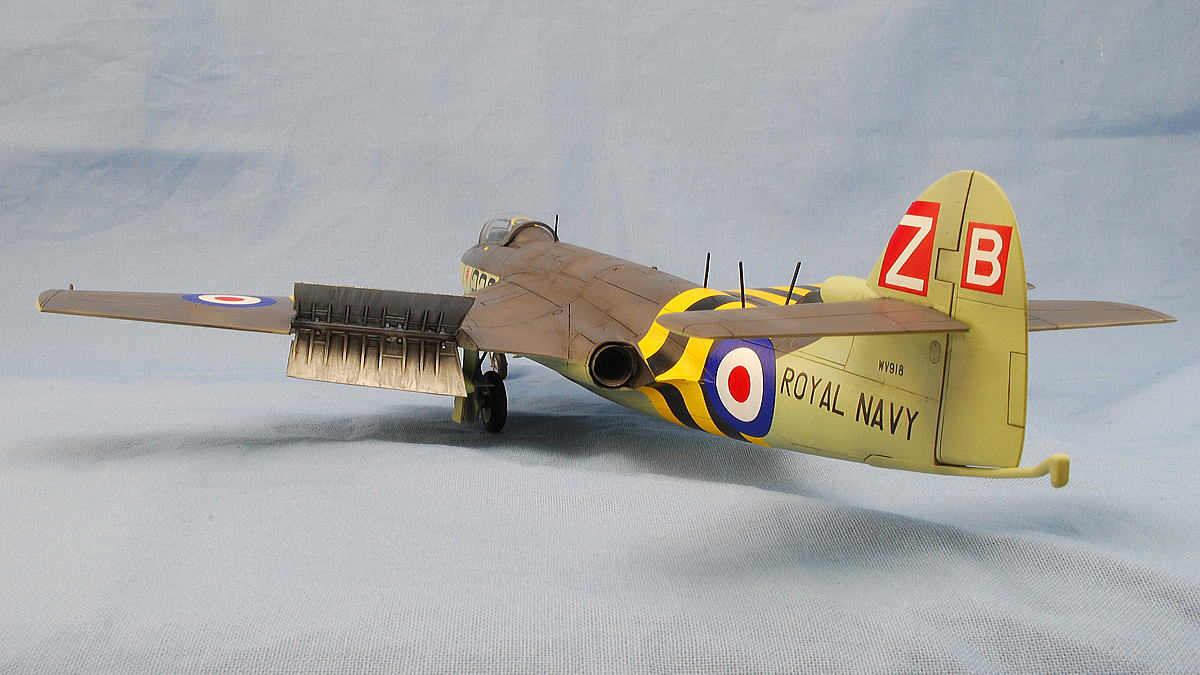 I made the first-generation fighter jet again, following the last Sabre. It was an easy assembly kit, generally. Recently, I built a lot of airplane plastic models. I like both jet and propeller planes.
I made the first-generation fighter jet again, following the last Sabre. It was an easy assembly kit, generally. Recently, I built a lot of airplane plastic models. I like both jet and propeller planes.
(29-August-2016)



コメント